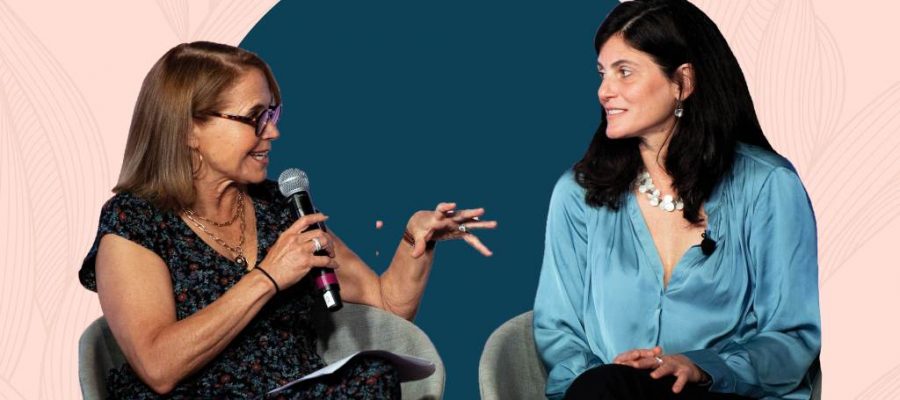Where do you turn after being diagnosed with a rare disease? The Chan Zuckerberg Initiative (CZI) knows there is power in numbers. Their Science in Society program is on a mission to cure, prevent or manage all diseases by centering patients as experts in the research process. During the Future of Health She Media Co-Lab at SXSW, journalistic icon Katie Couric; Tania Simoncelli, VP of Science in Society at CZI; Dr. David Fajgenbaum, a rare disease patient, renowned researcher and Rare As One grantee; husband and wife duo and Rare As One grantees Brian Wallach, ALS patient advocate; and Sandra Abrevaya, an advocate and caregiver, discussed reinventing the research ecosystem, galvanizing a patient-driven movement, and how to turn intentions into change.
As many as 7,000 rare diseases affect 300 million people globally. The vast majority are not well understood, and less than 5 percent have approved treatments. Yet, patients are meeting these challenges head-on. Dr. Fajgenbaum was diagnosed with Castleman disease, a rare disorder that involves an overgrowth of cells in your body’s lymph nodes. The most common form of the disorder affects a single lymph node, usually in the chest or abdomen. There are about 5,000 new cases every year in the U.S., and because it’s so deadly, there aren’t too many survivors, Dr. Fajgenbaum notes.
Dr. Fajgenbaum knew that if he wanted to survive this disease, he would have to build a community of patients, physicians, and researchers, and start looking for existing drugs that were already FDA-approved that could be repurposed for Castleman disease. And that he did. After having five near-death experiences, he is now in remission and has been for over nine years thanks to a preexisting life-saving drug. He’s even uncovered nine more drugs—both inside and outside Castleman’s disease—that can be used in new ways, for new patients.
The knowledge that Dr. Fajgenbaum has as a physician is invaluable. But what allows him to approach rare diseases with such nuance is his personal connection, which comes in the form of his own diagnosis. This spurred an idea in Tania. “I had been working in science policy for a couple of decades and doing a lot of research in biomedical research and innovation,” Tania says. “Along the way, I had found myself increasingly inspired and drawn to the work of patient advocates, and thinking that the patients were the ones really driving changes in our ecosystem, and yet they’re doing this on very few resources. Why aren’t we funding them as part of the solution to drive research forward? I wanted to go to CZI to build a program focused on bolstering the power of patient communities.”
Another patient advocate known for his activism is Brian Wallach. He was diagnosed with ALS the day his daughter came home from the hospital, and while the prognosis is typically six months, he’s been living with the disease since his diagnosis in 2017. Founded in 2019 by husband and wife team Brian Wallach and Sandra Abrevaya, I AM ALS was born out of their desire to rewrite the ALS story for Brian and the tens of thousands of other people with ALS. “Instead of going down his bucket list of vacation destinations, after being diagnosed, or frankly, helping me with a two-year-old and a newborn, Brian took to planes, trains, and automobiles to answer the question of what needed to happen in this space that wasn’t already happening,” says Sandra.
The answer? A community that needed to mobilize together to drive federal funding and legislation that could significantly accelerate the pace at which the government was developing and approving drugs, but also giving patients access to those drugs. Within six to 12 months of an ALS diagnosis, patients are excluded from clinical trials. But Brian and Sandra wanted to change that. “Brian literally went to [Capitol] Hill and said we need to write a bill that will allow patients after the drug has been proven safe in phase two, to get access before five years pass for the full approval because these drugs are not a safety risk and they’re showing some signs of efficacy,” says Sandra.
Katie noted that this hope, commitment, drive, and relentlessness is present in Brian, Sandra, Dr. Fajgenbaum, and all patients with rare diseases. “I was so moved by Brian and Sandra that I’m now an executive producer on their documentary titled No Ordinary Campaign,” says Katie. The film follows Sandra and Brian as they fight for their own future while seeking to build a brighter one for thousands of others. To take action in the fight against ALS, visit here. No act is too small.
This article was created by SheKnows for Katie Couric Media.
Source: Read Full Article

